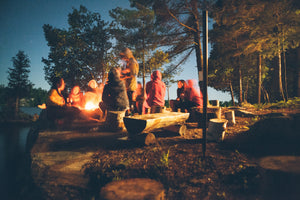Ten tips for stress-free camping with kids
Oct 03, 2020
With summer in the air and more people taking holidays closer to home, camping is high on the list of possible adventures for individuals and families.
The benefits of getting outdoors and away from computer and phone screens are wide-ranging. But if you’ve never been camping with kids, it may feel overwhelming planning for a family camping adventure.
Read on to learn our top tips for camping with kids, to make for an unforgettable trip – for all the right reasons.
1. Plan your trip
It may seem obvious, but when you’re travelling with children, it’s always best to plan ahead and book your campsite.
With the increasing popularity of camping, you should be prepared to book several months in advance.
Knowing where you’re going, and the amenities at your chosen site, will help with planning the rest of your trip.

Booking a campsite well in advance will assist you with planning the rest of your trip
2. Consider the best tent for your needs
There are many tent options available on the market. When camping with children, there are a couple of key aspects to consider:
- Does the tent provide space to sleep comfortably?
- Does it provide space for rainy day activities?
You may want to consider a bell tent rather than an expedition-style tent when camping as a family.
Unlike more classic tents, the circular style of a bell tent means there’s ample space to create a more homely and comfortable environment.
If you wanted to, you could even fit camp beds in a bell tent to level-up the comfort from sleeping on the floor.

The circular style of a bell tent provides ample space to create a homely environment
3. Test everything
If it’s your first time camping with kids, then it’s a great idea to have a dummy run.
If you have a garden, you might want to camp there for a night. Set up your camp and give it a go. The last thing you want is a stressful start to your adventure trying to set up a tent for the first time at the end of a long drive.
Consider on this test run:
- Do you have everything you need?
- Do you know how everything works?
- Is everything working?
- Does anything need charging, or new batteries, before your trip?
- Do your planned sleeping arrangements work?
For example, will the entire family be comfortable for more than a night of camping? If the family is sleeping on the floor, consider what you’ll be sleeping on. Sleeping mats may be a good investment for an extra level of comfort.

Consider on your test run if your planned sleeping arrangements work for the whole family
4. Keep to the essentials…
When camping with kids, it’s easy to over pack. Normally, this is by bringing too many clothes. Remember that you can re-wear items.
… but pack for all weather.
Even when your location is hot during the day, the evening temperature can be significantly lower. Make sure you pack extra layers, or thick tops and pants for after dark. And absolutely don’t neglect your rain gear!
5. Stick to your usual routine… as much as possible
When travelling with young kids, it is worthwhile trying to stick to your usual routine as much as you can. This includes nap schedules and bedtime rituals. It won’t guarantee a great night’s sleep, but a routine will help to significantly boost your chances!

Planning what meals you’ll make in advance can keep the kids engaged
6. Prepare meals
Consider preparing some meals in advance, especially if you’re arriving at the campsite quite late on your first day.
However, it’s also worth having a food plan beyond the first day. What food will engage the kids and is easy to cook?
If there are meals where the kids can safely get involved in preparing the food, then that’s even better.
7. Camping etiquette
Every time you go camping as a family is a good opportunity to re-enforce camping etiquette.
The basics include:
- No running through someone else’s campsite
- Teaching them to wake up as quietly as they can to avoid disturbing other campers
- Encouraging them to keep some distance between you and the other campers
- Educating them about fires and reminding them that fire areas can still be hot in the morning.
It’s a great idea to involve the kids in setting up the camp – even easy tasks like setting up tables and chairs will help them feel included in creating the site.

Every camping trip is a good opportunity to teach camping etiquette
8. Keeping clean
If you’ve booked your campsite well in advance, you will know the amenities that the site offers.
If the site doesn’t have showers, think about how you’ll bathe your kids. Baby wipes and sanitiser are a good stop gap for a skipped shower. But you may also want to buy a lightweight camp shower for longer trips – they’re easy to use and will help your kids go to bed clean.
If there aren’t any toilet facilities, a kid’s portaloo will be an essential item – perfect for those middle of the night emergencies.
9. Prepare for bad weather
While we all hope that our camping trips will be wall-to-wall sunshine, it’s worth packing suitable activities for bad weather days.
Books, colouring activities and packs of cards are all good entertainment possibilities.
You may want to avoid activities involving screens, such as phones and tablets, so that your children can fully enjoy the great outdoors. But if you do decide to take devices, make sure that they’re fully charged and that you have spare external battery chargers.
It’s best to avoid entertainment such as Lego and puzzles, as they have pieces that are easily misplaced and that can end up underfoot.

While we all hope for great camping weather, it’s best to prepare for rainy days
10. Light up
Finally, don’t forget to think about how you will light your camp.
You will need at least two types of lighting – static lighting around your tent and site, and lighting for on the move.
A normal torch for when you’re on the move will be fine, but you may want to consider a head torch, as it leaves your hands free for handling your kids.
There are many options for lighting your tent, but a pole tent light is a great solution to light your whole tent.
One final solution we love for after dark is giving kids glow sticks. They can wear them while they navigate the site in the dark. It’s a great way to keep track of them but also keeps them entertained.

Learn more
- Ready to prepare for your family camping trip? Explore our camping solutions
- Intrigued about bell tents? Read this blog post

